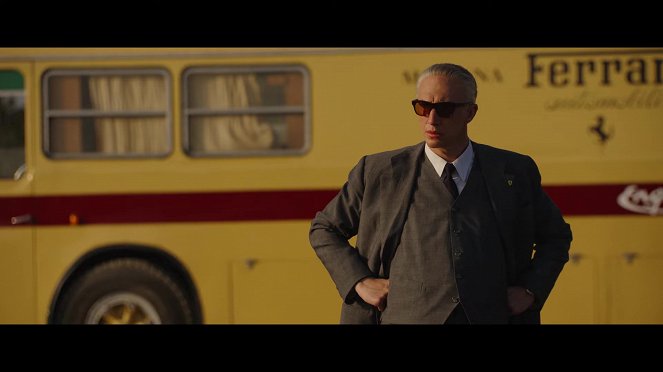Directed by:
Michael MannScreenplay:
Troy Kennedy-MartinCinematography:
Erik MesserschmidtComposer:
Daniel PembertonCast:
Adam Driver, Penélope Cruz, Shailene Woodley, Gabriel Leone, Sarah Gadon, Alessandro Cremona, Jack O'Connell, Patrick Dempsey, Daniela Piperno, Lino Musella (more)VOD (1)
Plots(1)
During the summer of 1957, bankruptcy looms over the company that Enzo Ferrari and his wife built 10 years earlier. He decides to roll the dice and wager it all on the iconic Mille Miglia, a treacherous 1,000-mile race across Italy. (Roadshow Films)
Videos (7)
Reviews (9)
The opposite of Le Mans in many ways. In terms of time narrative, it is a small, intimate racing film, a study of the tormented genius of Enzo Ferrari from the surprising perspective of a family drama, not a flashy driving symphony of speedsters. It's not that there's no driving, and it even has a nicely retro tone with an extreme dose of realism and physicality (except for those awful digital flying cars), but Enzo's living room, bedroom and office are the primary focus. Michael Mann has made a dream come true, in a largely un-Hollywood, non-mainstream way. It's going to be hard to make a lot of money with this film, but the production values are solid. It's not the genre we're used to with Mann, and some of his traditional trademarks are not and can't be here, but he hasn't disgraced himself.
()
The opening quarter-hour is a masterclass in introducing the central characters and their inner pain, conflicts and life motivations. This is particularly true of the character of Enzo Ferrari, industrialist and engineer, a man of iron and principle with a tattered family life. Adam Driver was born to play this role, and the film’s energy and tone come more from him than from the cars. Daniel Pemberton’s emotionally rich and energetic music, supplemented with vocals in places, give the film spirit. The retro stylisation of both the settings and the other characters is great, and each of the supporting actors has the necessary personality. The apt lines of dialogue make clear both the mortal danger of the race drivers’ passion and the difficult position of Ferrari and his company in the given industry – responsibility for lives not only in the quest for prestige, but also in the principle activity of maintaining the company’s business.
()
After many years, Michael Mann has fulfilled his dream and he does so with honour. But I can't help feeling that if he had taken the time to make it in his golden era in the 1990s, the result would have been much more daring. After all, this film about the fastest cars of its time doesn't exactly pull off the double whammy, surprisingly, especially on the track. As far as the Italian household of Ferrari is concerned, it's two gears better there thanks to the diabolical Penélope Cruz. Outside of the domestic tussle, however, on a comparable budget to the 4-year-old Ford vs Ferrari, Ferrari alone delivers considerably less value in terms of scale, suspense and action (the outlined rivalry with Maserati is just worthy of this bracket). Yes, the Millie Miglia was a completely different motorsport event from Le Mans, but the drama is always created by the racers themselves anyway, andin Mann's rendition they are bland. A great shame given the otherwise historically turbulent development of this race.
()
The omission of Penélope Cruz in the Oscar nominations is completely incomprehensible to me. Adam Driver is fine here, he doesn't try to overact with "Italian-style" expressionism, even in tense scenes his acting is nicely decent, and I even believed that grey hairpiece on his head, but the main star for me is Penélope. Not the cars, about which I know nothing, not the races, but this woman, tormented by emotions and doubts, fights an internal battle throughout the film, only to capitulate at the end, because the family business is above all. And related to this is Michael Mann's intention, he doesn’t try to approach Enzo Ferrari's life with some boring biographical description and ticking off the years, but to bring the marital discord of a prominent family to life in a short period of time. And the races are just a nice addition, though the production is nicely polished and the cinematography nicely dramatic. I'd have perhaps only two criticisms, I don’t think it’s necessary in a non-English speaking setting to adapt the English of the actors into some sort of accented pidgin, as happens here, and I would have preferred not to see those CGI cars flying through the air in such a nicely old-fashioned film.
()
Enzo Ferrari teaches his son that when things work well, they are pleasing to the eye. Michael Mann follows the same maxim. Ferrari, another of his portraits of an obstinate professional in an existential crisis, is a joy to watch thanks to its narrative cohesiveness and the fact that it rhythmically fires on all cylinders. During practically every shot in the exposition, we learn some important information that will be put to good use later in the film. At the same time, the exposition introduces the governing stylistic technique consisting in the use of duality and contrasts (e.g. light scenes with Enzo’s mistress vs. dark scenes with his wife). Slower scenes regularly alternate with faster ones, movement alternates with motionlessness and the melodramatic (and utterly operatic in one scene) exaggeration of certain emotions, particularly sorrow, which both spouses deal with, each in their own way. Mann follows the example of classic Hollywood directors like Hawks and Sirk and lets the mise-en-scéne tell much more of the story than other contemporary directors would allow. At the same time, he defies the conventions of classic biographical dramas as he focuses only on a brief period of Ferrari’s life and, instead of creating artificial conflicts, he superbly dramatises everyday encounters and ordinary business operations (paying wages, signing documents, concluding agreements with investors). This feel for detail also contributes to the believability of the fictional world. Ferrari’s work always clashes – either constructively or destructively – with his personal life (Ferrari finds common ground with his son thanks to his work, but he also loses his wife because of it). The lion’s share of emotion and excitement is typically found in the cinematically brilliant scenes of races, which represent Ferrari’s greatest passion. Unlike other sports movies, however, such scenes do not bring catharsis, but rather recall the fragility of life (thanks in part to the excellent sound design, the race cars of the time really do not seem safe) and recognition of the fact that however hard you try to have everything under control, certain events cannot be foreseen and you ultimately have no choice but to accept them and somehow incorporate them into your life story. 90%
()



Ads